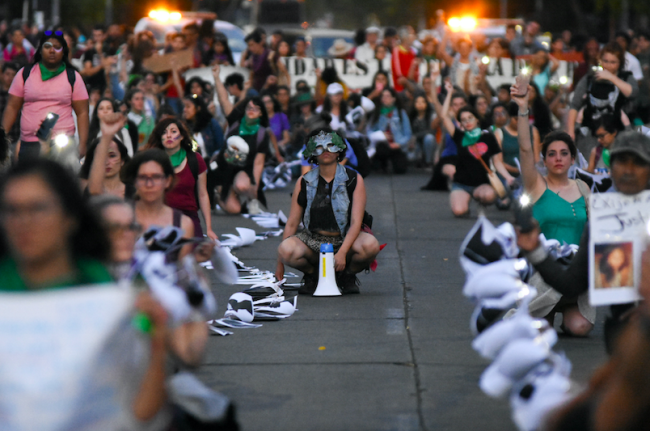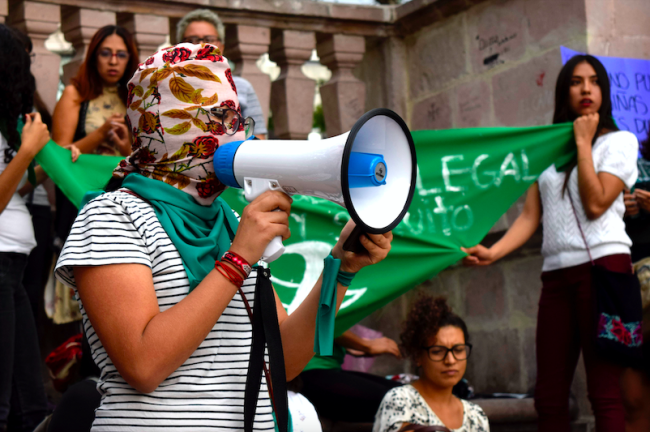
This piece appeared in the Spring 2023 issue of NACLA’s quarterly print magazine, the NACLA Report. Subscribe in print today!
Leer este artículo en español.
Al Qaeda. The Jalisco Nueva Generación Cartel. Feminist collectives. Students of the Ayotzinapa teacher training school.
So reads a list of groups that could pose a threat to the operations of the International Felipe Ángeles Airport in Mexico City, drawn up by the Secretary of National Defense. The list was leaked by the Guacayama collective, and it confirms what many of us already knew: the repressive forces of the state have their eyes on the feminist movement.
It is no exaggeration to say that the power of feminism, which is felt in marches on March 8 (International Women’s Day), November 25 (International Day for the Elimination of Violence against Women), and other dates, has made it one of the most important movements in Latin America.
Women in Mexico are organizing and joining forces against all of the violences we face, from homes to the streets, from schools to hospitals and other institutions, as well as in our workplaces and in mixed spaces. Beyond naming and protecting others from the aggressions of violent men, our unity and presence in the streets give us tools to break the patriarchal pact that is so present in daily life and politics.
Feminists and women participate in broad and diverse struggles: against racism, for memory, by searching for the disappeared, in defense of water and territory, for labor rights and justice, for the right to free, safe, and legal abortion, in support of migrants, for the legalization of marijuana, against violence, and for peace.
The election of Andrés Manuel López Obrador in 2018 led many to feel renewed hope for change from within the political system. But the combination of republican austerity, which has led to budget cuts in many public sector institutions, and the strengthening of the state repressive apparatus are extremely concerning. For the most part, feminists have been critical of the militarist and deeply conservative turn of the current government, which has led the president to smear them as reactionaries opposed to change and transformation.
To understand the strength of women, trans people, and non-binary people, and the attempts to constrain the feminist movementduring a political period in which the government appears progressive and claims to practice “feminist foreign policy”I spoke with Alicia Hopkins in Mexico City and Lirba Cano in the city of Guadalajara, Jalisco.
Hopkins has been organizing and mobilizing in mixed collectives for years. In 2019, she helped to cofound the Comuna Lencha Trans (Lesbian Trans Commune), where she now lives and works together with other compañeres on building autonomy in Mexico City.
Cano founded Cuerpos Parlantes, a feminist space in Guadalajara, 10 years ago. Before then, she lived in Barcelona, where she organized with antiracist groups. After returning to Mexico, she worked with collectives of workers and Zapatista-inspired groups.
The three of us did a video call in early December, which has been translated from Spanish and lightly edited for length and clarity.
Dawn Marie Paley: I wanted to start by asking you about the spaces that you’ve built in the cities that you live in. What is the goal of your projects, and how are they working today?
Alicia Hopkins: The Comuna Lencha Trans began as an effort to survive in Mexico City.
We started with a community cafeteria in January of 2020, but then the pandemic hit and all of the projects we were planningwe wanted to hold a popular feminist schoolwere put on hold.
We had to close the house and the community cafeteria; we didn’t re-open again until May of 2021. But we never shut down completely because we were all coming out of a process of intense precarity, so we worked in the kitchen and sold food, which allowed us to keep going, more or less, without having our doors open. We were mostly selling takeout.
Now we have a self-managed kitchen in the Comuna, we hold cinema nights, we have a printing press and screen-printing workshop, a reading circle, and a therapeutic space. We offer courses and workshops; we also hold sales where compas come through with their own projects. Every second Friday we host a lesbotanero, which is a time for enjoyment and celebration.
This experience has given us an education in organizing and training that’s been super important. Many of us came out of organizing and militancy, but not necessarily in the home, not necessarily sharing daily life. And that aspect opens up a ton of dimensions, from the material to the symbolic, which is also connected to our affective relationships. It’s a wager that is at once ethical and political for us.

Lirba Cano: We decided to open Cuerpos Parlantes with the intention of creating links with the feminist movement in Guadalajara, while we were faced with violences close to our circles, especially with regards to high levels of feminicide and enforced disappearances. We needed to create those links for survival as well, for our own safety, to be able to think together and understand what is happening and especially, to have a space to organize ourselves. We’re also facing gentrification and displacement in the urban center of the city, which we’ve been documenting for more than a decade.
We hosted many of the organizational assemblies and hosted the preparations for March 8 in Guadalajara at Cuerpos Parlantes, as well as for the actions for November 25. We’ve helped support networking and the organizing of the feminist network YoVoy8deMarzo since its founding in 2014. Our main role is creating spaces of political education from a feminist perspective, like the Feminario (feminist courses), so that we can understand the violences that we’re experiencing and enable a deeper understanding so that we can carry out more effective actions.
Over these years, feminist thinking has allowed us to recognize the need to be connected with people who are organizing. Opening up this thinking for the whole community lets us generate a deeper kind of organization in the face of the problems we’re dealing with, which we do through building a common understanding of the situation.
DMP: I wanted to try and weave in these very concrete organizing experiences in the spaces you have built over the yearsand congratulations for the 10-year anniversary this year, Lirbawith a reflection from your situated spaces about the feminist mobilizations, the experience of being in the streets, and the purple explosion. What has it been like to participate in that, to live that?
LC: It’s been a very enriching and very interesting process. Organizing in assembly is like being in a classroom where there is a very concrete pedagogy, and you learn so much. You learn to communicate, you learn to make an argument, and you learn to organize with all different women.
Then it takes a material shape in the streets, and you can feel the collective power in your bones. It’s such a powerful feeling, the sense that things can change. That we can change them! The marches, the demos, and the activities are very powerful, and they open the possibility that we can communicate with others.
There’s been a very important process with respect to communication, and communication means that every year the march is bigger. I started to organize around this nine years ago, with the creation of the YoVoy8deMarzo feminist network in 2014.
Back then there was a generation of feminist compañeras who exercised their activism inside institutions, to an extent, but there wasn’t much movement in the streets. The youth weren’t mobilized. There was little movement inside the universities.
It was quite strange, because we could see that feminicide was increasing, that the crisis of disappearance was on the rise, and everything was very careful and very orderly within the institutions
We felt the need to loudly interrupt this in the streets, to make the walls speak about the tremendous problem of violence. Over the past years I have watched how the materialization of our bodies in the street has been accompanied by mobilization inside of the universities and in many other spaces of daily life.
As women we have dared to raise our voice because we are part of a feminist movement that is constantly taking to the streets.
Read the rest of this article, available open access for a limited time.
Dawn Marie Paley is an investigative journalist and author of Drug War Capitalism and Guerra neoliberal: desaparición y búsqueda en el norte de México. She is a member of NACLA’s Editorial Committee.

